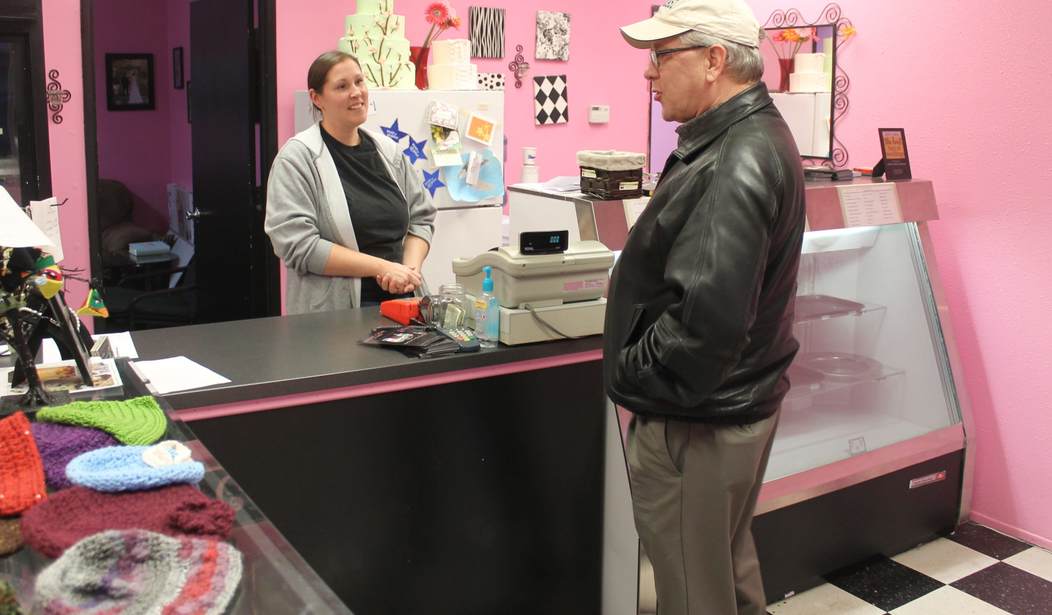On Monday, the attorneys general of eleven states signed a brief urging the U.S. Supreme Court to take up the case of Aaron and Melissa Klein, erstwhile owners of the bakery Sweet Cakes by Melissa, which went out of business when Oregon fined them $135,000 for refusing to use their artistic expression in support of a same-sex wedding.
“Taking up the Oregon conscience rights case will provide the U.S. Supreme Court an opportunity to affirm that the First Amendment contains robust protections for people to live in accordance with their sincerely held religious beliefs,” Attorney General Ken Paxton (R-Texas), told PJ Media.
The Texas legal team spearheaded the brief, which was also signed by Attorneys General Steve Marshall (R-Ala.), Mark Brnovich (R-Ariz.), Leslie Rutledge (R-Ark.), Jeff Landry (R-La.), Doug Peterson (R-Neb.), Adam Laxalt (R-Nev.), Mike Hunter (R-Okla.), Alan Wilson (R-S.C.), Sean Reyes (R-Utah), and Patrick Morrisey (R-W.Va.).
The Kleins appealed their case to the U.S. Supreme Court in October after the Oregon Supreme Court refused to consider it.
Sweet Cakes by Melissa gladly served all people, regardless of sexual orientation, but the Kleins could not in good conscience lend their artistic talent to creating a cake to celebrate a same-sex wedding. The bakery did not mass-produce cakes, but only crafted cake art for specific events, and it became deeply involved with every wedding it celebrated.
In 2011, Rachel Cryer and Laurel Bowman, a lesbian couple, requested a cake to celebrate the marriage of Rachel’s mother to a man. The Kleins, knowing Cryer and Bowman were homosexual, gladly took the order, and the couple were so happy with the cake that they wanted Sweet Cakes to make a similar cake for their own ceremony.
When the Kleins denied this latter order, Cryer and Bowman went to the Oregon Bureau of Labor and Industries (BOLI), complaining that they had been “mentally raped” by the rejection, even though the couple found another bakery willing to create the cake at a much lower price. BOLI ruled that Sweet Cakes by Melissa had discriminated against Cryer and Bowman due to their sexual orientation, and slapped a $135,000 fine on the Kleins, in addition to a gag order.
While the gag order was later lifted, an appeals court upheld the fine in December 2017. The Kleins were able to raise a great deal of money on GoFundMe, until a mob pressured the crowdfunding site to take down the page. The bakery closed in 2016.
In their brief, the attorneys general argued that “designing and creating customized art for the centerpiece of a wedding deserves the strong protection afforded to artistic works, regardless of its medium. Creating custom designs and accompanying works celebrating a wedding is artistry—whether it takes the form of a painting on a canvas, a figure carved into ice, or piping and sculpting on a centerpiece wedding cake.”
Because the creation of cakes to celebrate an event constitutes artistic speech, the government does not have the right to force bakers like Aaron and Melissa Klein to celebrate a same-sex wedding, the attorneys general explained. Indeed, Oregon’s actions involved compelled speech.
“The government in this case went beyond preventing someone from affirmatively engaging in conduct,” they wrote. “Rather, the State here is compelling artists to create artistic expression they do not want to create. No precent supports this. …. Because art is inherently expressive, the State’s compulsory rule violates the First Amendment.”
State agencies like BOLI argue that public accommodation laws require bakers like Aaron and Melissa Klein to serve everyone, and therefore they must serve every event, even if that means expressing messages with which they disagree. This argument falls apart for many reasons.
As the attorneys general argued, “public-accommodation concerns of past eras are not present here; customized pieces of art are not public accommodations (like restaurants and hotels), the artist plainly did not act out of invidious discrimination, and complainants had immediate access to other artists, in any event.”
“If States wish to facilitate the commissioning of artistry for same-sex weddings, they must look to more nuanced and less invasive approaches,” the attorneys general wrote.
Indeed, the lesbian couple in this case found another bakery, as so many in the same situation have. States may, if they wish, promote the bakeries that would serve same-sex weddings, but they cannot force bakers to speak against their will.
The Supreme Court should take up the case, and it should bring much-delayed justice to Aaron and Melissa Klein.
Follow the author of this article on Twitter at @Tyler2ONeil.









Join the conversation as a VIP Member